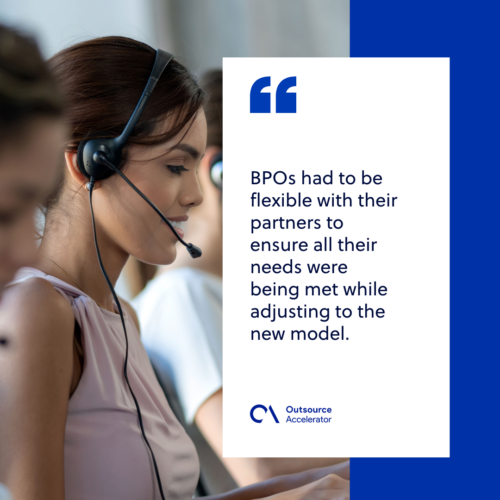Flexible work: The reality of BPOs post-pandemic

When COVID-19 first made its appearance in 2019, no one predicted the future it held and the long-term changes it caused. Governments worldwide required their citizens to go into lockdown for extended periods, which negatively affected the economy and specific industries. Business process outsourcing (BPO) companies were not spared the challenges posed by the pandemic.
The world shifted to an almost entirely virtual lifestyle. Those who were working in an office pre-pandemic now were setting up an office in their spare room to work from home. Companies had to learn to work virtually and run effectively while offering their employees and contractors a flexible workplace.
For those businesses that we’re able to stay afloat during the pandemic, the BPOs they utilized had to adapt and be flexible with their partners. Whether or not BPOs were able to do so with their partners throughout the pandemic determines the BPO sector’s fate post-pandemic.
BPOs pre-pandemic
Before COVID-19, BPOs were a fast-developing sector providing many jobs. Businesses found BPOs attractive for a number of reasons. The biggest being that outsourcing administrative support was more cost- and time-effective than hiring someone to work in their office. Companies could save money on hiring labor and keep their office size smaller since fewer people were physically there.
Before COVID-19 turned the world upside down, BPOs operated out of office spaces in a call center design. Employees would perform their assigned duties on their desktop computers equipped to handle any tasks given. Every tool a BPO employee needed was at their fingertips. With government-enforced lockdowns, BPOs were forced to reevaluate how they conducted business with their partners and employees.

Challenges for BPOs during COVID-19
No industry or individual was safe from the challenges that the pandemic caused. BPOs and those following a BPO career path had their own specific challenges to overcome and will continue to grow from.
Transition to work from home
When health professionals deemed it unsafe to work in traditional office environments, governments worldwide enacted mandatory lockdowns. BPOs had to adapt to the new normal. They had to act quickly to ensure they could obtain the necessary equipment for their employees to work safely from home.
Their dedication to acquiring the equipment needed for this transition proves BPOs embraced a WFH lifestyle. Many BPOs didn’t readily have laptops or desktops for their employees to use at home. They had to act quickly to provide these tools to their employees to continue supporting their partners.
Several BPOs were not prepared with technology to monitor their employees’ productivity remotely or didn’t have the necessary security systems to keep their partner’s information safe while working with internet-based software.
Ability to be flexible
When BPOs begin working with a partner, contracts are put in place to protect both parties. When the pandemic spread, many statements in those contracts didn’t apply anymore. BPOs had to be flexible with their partners to ensure all their needs were being met while adjusting to the new model.
Some BPOs were more eager to be flexible with their partners than others. If BPOs were unable to have the flexibility to work with the companies they partnered with, their partners would have to decide to end the relationship, putting people out of work.

BPOs’ post-pandemic reality
With government lockdown restrictions lifting, BPOs will have to evaluate how they operate in the world’s new normal. Like many industries, BPOs have realized employees can do a lot of the work remotely. Being able to offer a flexible work schedule to their employees that fit with their partners’ needs is something many have taken into consideration, as well as the choice of working in the office or from home.
BPOs had to adjust their work models to incorporate more technologies that fit into a virtual world. If they cannot keep up with the changing world, they’ll be left behind or traded for AI business support. Many have adapted to using similar business practices with the combination of AI technology.
With much of their employee base working from home, BPOs incorporated new technology that will allow them to perform quality work without being in an office setting. Those who embraced the changes and were able to overcome challenges can still find BPO career growth in the future.
Working through a pandemic poses a lot of challenges and forces people to adapt to all facets of their lives. The BPO sector was the highest-growing industry pre-pandemic and still can be post-pandemic. Those who began working for a BPO will still have a BPO career post-pandemic.
With everything that has changed in the business world since COVID-19, BPOs have had to be flexible with their partners and employees to ensure their sector stays in high demand. BPOs have prevailed in finding ways to support their business partners through flexible work situations to flexible work hours. The reality that BPOs face in a post-pandemic world is that adaptation and being flexible is the new normal.







 Independent
Independent




